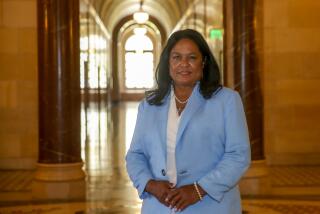With L.A. in a budget crisis, two council candidates offer very different credentials
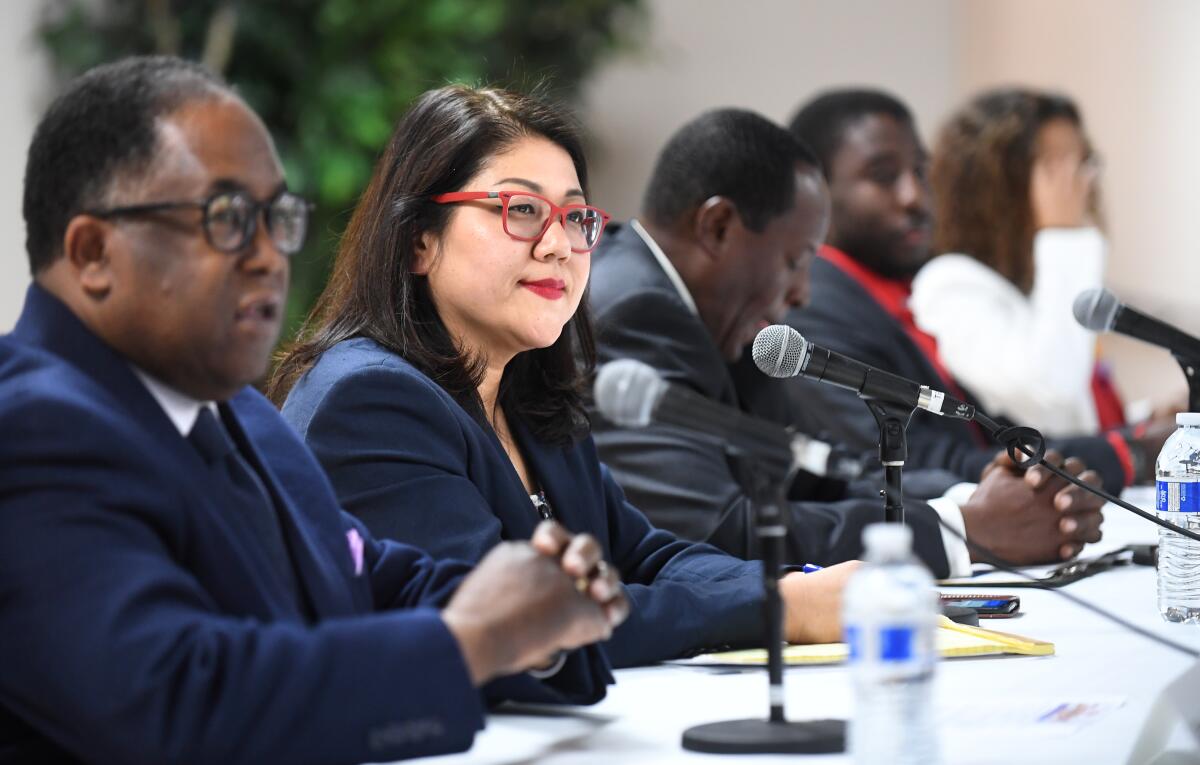
- Share via
The two candidates running to succeed Los Angeles City Councilman Herb Wesson have spent the last year laying out their ideas for tackling two of the issues that have preoccupied City Hall this year: homelessness and political corruption.
But now, with COVID-19 continuing to batter the region’s economy, the winner of Tuesday’s election will be forced to confront an even more urgent topic: the city’s worst budget crisis in at least a decade.
L.A. County Supervisor Mark Ridley-Thomas and attorney Grace Yoo both say they have the experience and qualifications to tackle the revenue shortfall, which is expected to reach at least $400 million by June, threatening police, fire and other services. But they have very different relationships with the city’s political establishment.
Ridley-Thomas, who has held office nearly 30 years, has balanced budgets as a council member, a state legislator and, most recently, as a powerful supervisor representing 2 million people from Carson to Culver City. He has racked up endorsements from public employee unions that represent police officers, firefighters and civilian city workers and from big names in the Democratic Party.
Yoo, who spent nearly a decade running a nonprofit group that assists Korean Americans, has taken on City Hall from the outside, challenging real estate projects, zoning rules, a plan for ripping out street trees and the 2012 redistricting process that redrew L.A.’s political maps. With some union groups spending six figures to elect Ridley-Thomas, Yoo contends she will have more freedom to act independently on financial matters.
“Mark will have a hard time saying no,” said Yoo, 49.
Ridley-Thomas, 65, strongly disputed that assertion, saying his track record has shown he is “beholden to no one.” He pointed out that, during his 12 years as supervisor, county government has been considerably more stable than City Hall, which is currently discussing furloughs and a potential layoff scenario.
“I do think that the county is better run,” he said. “Part of that is more stable revenue streams and, simply stated, a more conservative fiscal posture.”
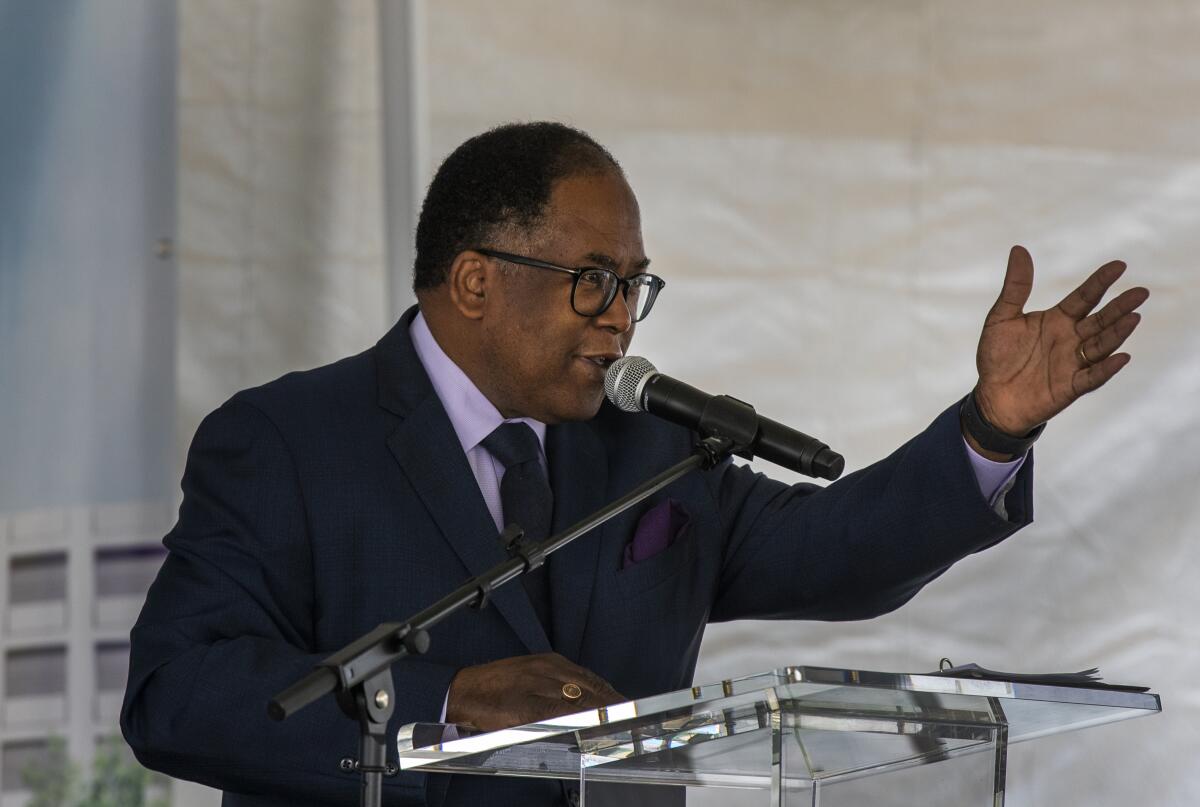
Yoo and Ridley-Thomas emerged in March as the top two vote-getters in the race to replace Wesson, who represents Koreatown, Mid-City, West Adams and neighborhoods in South L.A. Ridley-Thomas garnered 44% of the vote, putting him 20 percentage points ahead of Yoo but shy of the amount needed to avoid Tuesday’s runoff.
Ridley-Thomas’s top financial supporter this year has been the county Federation of Labor, whose committees have spent more than $490,000 on efforts to elect him. A separate committee sponsored by the Department of Water and Power’s biggest employee union, along with an entity called the Golden State PAC 2020, have spent another $160,000 on election materials slamming Yoo.
Golden State is partly funded by petroleum interests and by City Hall lobbyist Michael Bai, who recently represented a hotel developer who sought city taxpayer help for his planned project.
Dermot Givens, a political consultant who lives in the district, believes Yoo has an uphill climb. In the COVID-19 era, with door-to-door campaigning limited, “it’s the political relationships and the network that get you the win,” he said.
“He’s got a political machine. He knows what to do. He’s done this a thousand times before,” said Givens, who runs BlackMenVoting.com, a group campaigning for the Biden-Harris ticket in other states.
With her rival outspending her 2 to 1, Yoo has attempted to even the playing field by creating a website attacking Ridley-Thomas on various issues, including his public remarks raising the idea of a run for mayor. She picked up support from United Teachers Los Angeles and several political figures who, to some degree, have also functioned as outsiders, such as former Councilman Bernard C. Parks and former City Controller Laura Chick.
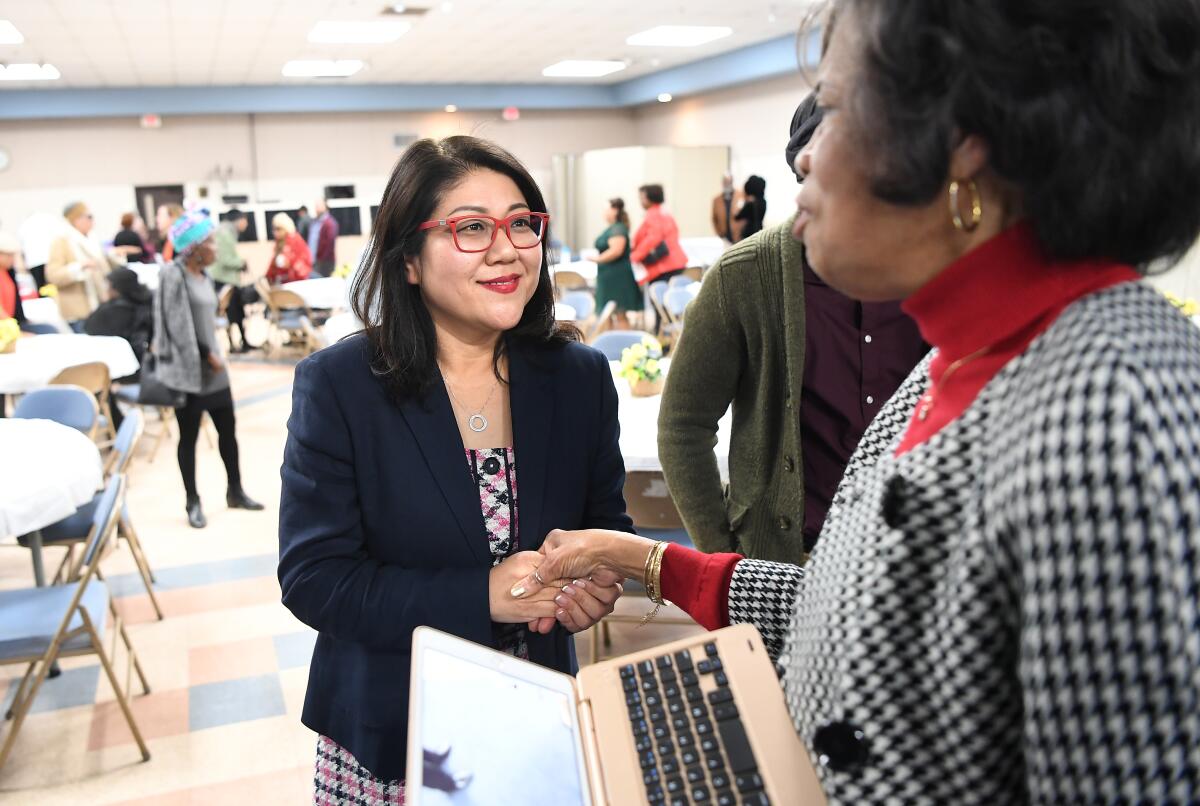
Parks, who spent several years heading the council’s budget committee, expects Yoo will tackle the budget crisis by tapping her experience running the nonprofit Korean American Coalition.
“She understands that when it comes to dealing with money, you can’t spend it if you don’t have it,” said Parks, who ran against Ridley-Thomas unsuccessfully in 2008.
Because he served previously on the council, Ridley-Thomas will be permitted to serve only a third and final four-year term if he wins. And despite his history of election victories, Ridley-Thomas has not been taking chances, leaving voters phone messages from Gov. Gavin Newsom and Sen. Kamala Harris and portraying Yoo as a foe of affordable housing and an obstacle to solving homelessness.
That claim stems in large part from Yoo’s support for Measure S, a 2017 city ballot measure that would have blocked council members from approving real estate projects that did not comply with existing planning and zoning rules. Ridley-Thomas said the ballot proposal would have stopped affordable housing developers from getting their projects built.
“That’s why the people of this city with a full throat rejected Measure S,” he said.
Yoo said she supports more affordable housing, including a four-story project going up directly behind her backyard. Measure S, she said, was written to keep council members from rewriting zoning rules for big campaign donors.
Had Measure S had been approved, at least some of the corruption alleged in a federal indictment might not have taken place, Yoo said.
“There would have been much more scrutiny” of planning decisions by council members, she said. “They couldn’t just willy-nilly say, ‘Our planning is obsolete, so we’ll let you have 35 stories.’”
Yoo, who lives in L.A.’s Angelus Vista neighborhood, describes the FBI probe and the homeless crisis as evidence that City Hall needs a fresh face, not a “career politician.”
“If you think things in L.A. are going well — vote for Mark,” her campaign said in one recent ad.
Ridley-Thomas, in turn, says his career is filled with accomplishments, including new affordable housing, more funding for homeless programs and the reopening of Martin Luther King Jr. Community Hospital. An advocate of police reform, he has been an outspoken critic of Sheriff Alex Villanueva, calling for his resignation.
Bob Schoonover, president of Service Employees International Union Local 721, said he views Ridley-Thomas’s experience as a strength.
“When you’re in a time of crisis, you want to have someone who has an idea of how the city budget works,” said Schoonover, whose union represents 66,000 city and county workers, and has put at least $150,000 into the effort to elect Ridley-Thomas.
Schoonover, who opposes the city’s efforts to furlough workers, says the magnitude of the city’s crisis is still unclear.
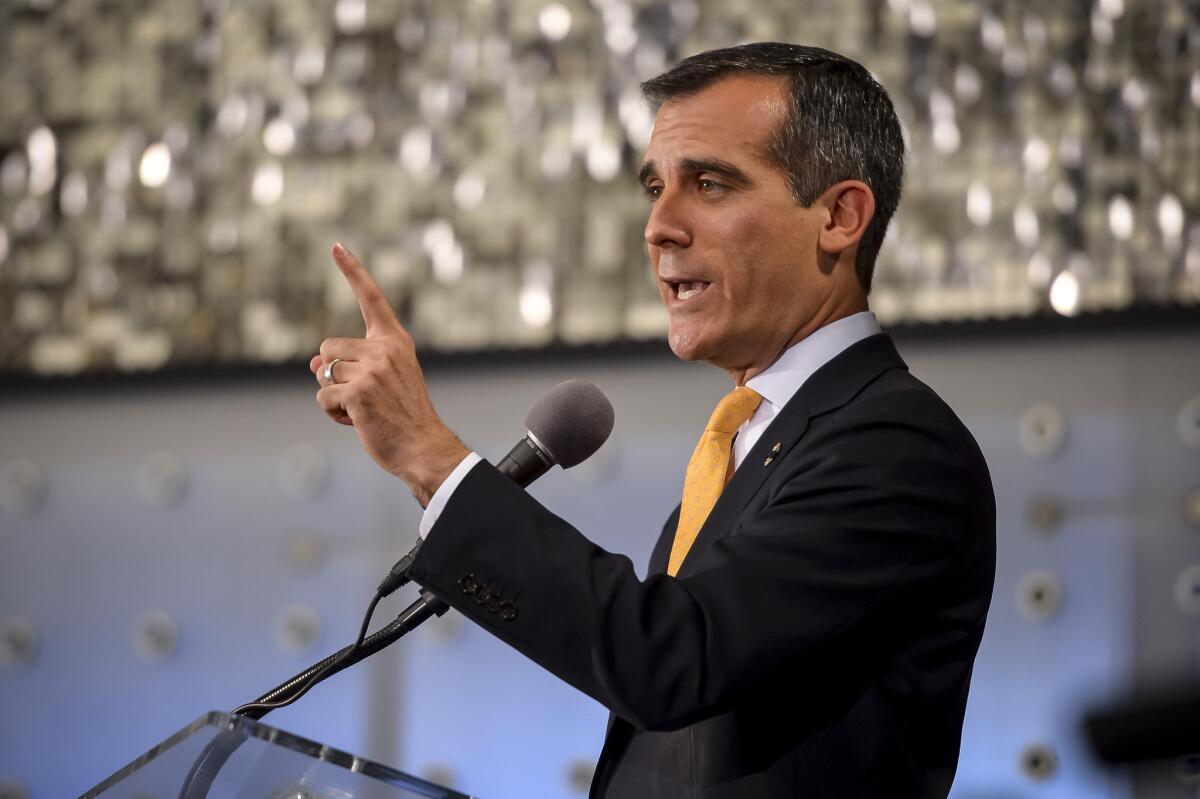
Mayor Eric Garcetti has argued in favor of a federal bailout, which could depend on who wins the White House and takes control of the U.S. Senate. Ridley-Thomas has expressed hopes that voters will approve Proposition 15, which would remove state limits on property taxes for commercial properties, freeing up billions of dollars for local government.
Activist groups say the budget crisis should be solved by cutting deeply into the LAPD, shifting the savings into housing, mental health and other programs.
Ridley-Thomas promised to make homelessness his top spending priority, placing an emphasis on prevention and intervention. But he pushed back on the idea of huge reductions to police, saying the city is already experiencing an uptick in crime.
“Constituents and voters are due a level of public safety, and it’s nonnegotiable,” he said.
Yoo said she expects the LAPD, along with every other city agency, will need to make cuts, but cautioned that it’s too early to know how large those should be.
“I’m going to save lives and save dollars,” she said. “I just don’t know how it’s going to come, and in what format.”
More to Read
Sign up for Essential California
The most important California stories and recommendations in your inbox every morning.
You may occasionally receive promotional content from the Los Angeles Times.

